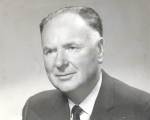
by
Melvin
Baker
(Originally published in the Newfoundland Quarterly vol. XCII1, no. 1 (Fall 1999), 33-4.

Charles Ronald McKay Granger was born in Catalina on 12 August 1912, one of two children of David Charles and Emilie Sarah (Bursey) Granger. On 19 June 1950 he married Elizabeth Jane French of Moreton's Harbour and they had four children.
On his father's side, he came from a long line of tradesmen. His great-grandfather was a carpenter who had come to Trinity from Somerset, England about 1820 and worked as a carpenter. His grandfather, also named Charles, was born in Trinity in 1838 and moved to Catalina in the late 1850s to establish a wood-working shop. David continued the business until his death in 1945. Until the 1930s Catalina was a major port on Newfoundland's northeast coast supplying both vessels and men for the coastal freighting trade and the transport of fish to foreign markets. In the late 19th century it had been a major port for the Grand Banks fishery. The Grangers served the general community as cabinet makers, wheelwrights, blockmakers, casket makers, and general wood workers.
Granger was educated at St. Peter's Anglican High School in Catalina. During the 1930s he worked in his father's workshop and wrote a regular news column on Catalina for the Fishermen's Advocate. His columns provided rich detailed information on community activities. Having developed a love of poetry while in school, he began writing poetry which he published in the local press, mainly in the Advocate ( In 1967 he edited the poetry section in volume four of The Book of Newfoundland published by Premier Joseph Smallwood). He was also active in 1937 in the establishment of the Joseph E. Clouter Memorial Library at Catalina, the first public library to be established outside St. John's. He was secretary-treasurer of the library board from 1938 to 1946.
When the editor of the Advocate, Jack Scammell, became ill and required hospitalization, Granger at short notice took over the editorship of the newspaper on a temporary basis. Following Scammell's death on 18 September 1940, Granger was hired to edit the Advocate full time. The newspaper continued to emphasize news items of interest to its readership along the northeast coast. Reflecting his love of poetry, the newspaper's articles often took on a lyrical tone. His account of a major sleet storm, which struck the Catalina/Port Union area on 27 January 1942 and downed power lines, is typical of Granger's writing style: "nothing could be seen of Port Union, probably the most brilliantly lit town in Newfoundland, and one of the most brightly lighted places in the world, save a mass of shapeless blackness... As the night wore on a number of lights appeared, showing yellow and dim, as long unused lamps were lighted or candlelight wavered from saucers. On Sunday ... the streets were a litter of broken glass and twisted poles, while ships in the harbor were cased in a white translucent shroud."
During the early 1940s Granger opened the Advocate's columns to confederate advocate Gordon Bradley for whom Granger had developed a strong political admiration. Bradley had been an elective member of Newfoundland's pre-1934 House of Assembly and favored confederation with Canada as an alternative to either responsible government or the existing system of Commission of Government. In 1948 Granger replaced Ken Brown as president of the Fishermen's Protective Union (FPU) and served until 1949 when he was succeeded by Gilbert Yetman. He accepted the presidency on the condition that the FPU remain neutral on the confederation issue, despite Bradley's objections to the contrary.
He resigned the editorship of the Advocate on 19 April 1949 and in July became private secretary to Bradley, who had been elected in 1949 to the House of Commons and appointed as Newfoundland's federal cabinet minister as Secretary of State. In 1953 Jack Pickersgill succeeded Bradley as Newfoundland's representative in the federal cabinet and Granger served as Pickersgill's private secretary and executive assistant until 1957 when he accepted a position as Deputy Minister of Highways in Newfoundland. The following year Granger won election to the House of Commons for the District of Grand Falls-White Bay-Labrador; he won re-election in 1962, 1963, and 1965. In August 1966 he resigned from the House of Commons and successfully contested the District of Gander in the provincial election held on 8 September and was appointed Minister of Labrador Affairs. Granger resigned from the House of Assembly on 25 September 1967 and, after winning a 6 November 1967 federal by-election, he entered the federal cabinet as a Minister without Portfolio. In the 25 June 1968 general federal election Newfoundlanders resisted the political blandishments of Liberal Prime Minister Pierre Trudeau and returned Progressive Conservatives in six of the province's seven districts. Following his electoral defeat, Granger from 1968 to 1975 was vice-president of Shaheen Natural Resources Company which built an oil refinery at Come By Chance.
Retiring to Catalina, Granger was active in community life and was a vocal advocate of preserving the area's history and heritage. In 1995 he was named to the Order of Canada. He died at Catalina on 22 April 1995.